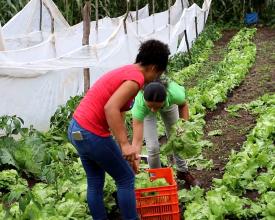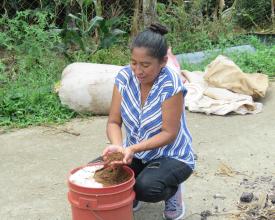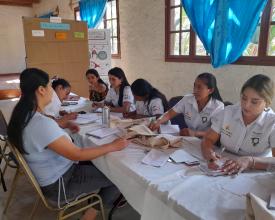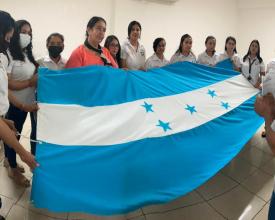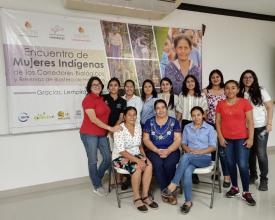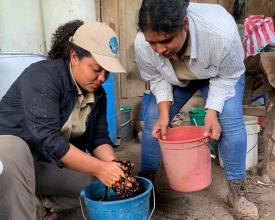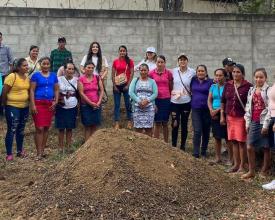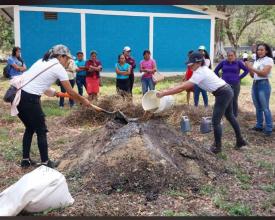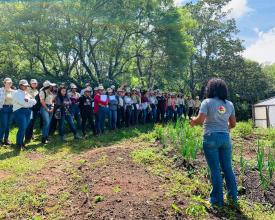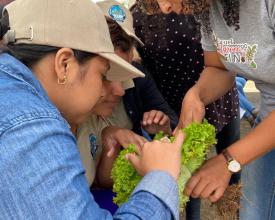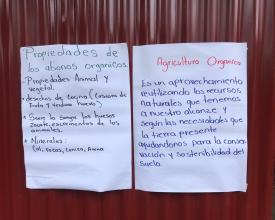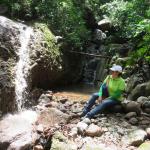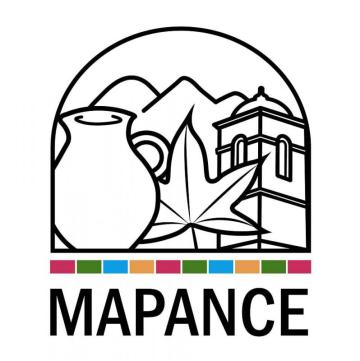
Women's empowerment in agriculture in biosphere reserves
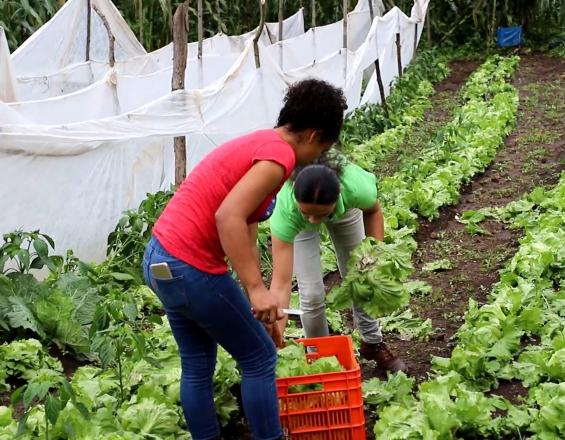
Regardless of age, ethnicity or social status, the women of the Cacique Lempira Señor de las Montañas Biosphere Reserve (RBCLSM) in western Honduras have in common not only to ensure the livelihood of their families, but also to achieve the sustainability of natural resources, as they are the main ones affected by the effects of climate change. To this end, they participate in strengthening processes in agroecology, agroforestry systems, creation of native seed banks and beekeeping production, among other things, and join in decision-making spaces that, in the past, were the responsibility of men, such as water management boards.They also participate in decision-making spaces that, in the past, were the responsibility of men, such as water management boards. Thus, the women of this territory have been empowered to maintain a direct relationship with natural resources, promote work in their communities and fight for the protection and conservation of ecosystems and their biodiversity.
Context
Challenges addressed
Today, the role of women is not only limited to household activities, but they have also occupied new spaces as producers and decision-makers who have an impact on the economic, social and environmental development of their families and communities.
However, this was not always the case, as historically their role had been restricted by their own physical and cultural characteristics.
The challenge was to identify how to reduce these inequality gaps and achieve women's participation in the management of biosphere reserves. In order to do this, it was important to address a gender strategy in an integral manner, that is, to achieve the participation of all members of the family, in order to generate opportunities for women to participate in training and capacity building processes.
Location
Process
Summary of the process
In many areas of Honduras, especially in rural regions and/or biosphere reserve territories, women are relegated to their role as caretakers of the household. These cultural patterns limit their participation in development processes, which is why it is necessary to involve the entire family nucleus in the different actions carried out in protected areas, biosphere reserves and development projects.
Given this reality, it is necessary to generate training spaces with an integral approach, that is, with the participation of all family members. Under this participatory scheme, the inclusion of young people and women is achieved, as well as the promotion of generational change, in processes of capacity building on various topics.
In addition, the Women's Network has emerged as a space to share knowledge, to support each other and, above all, to make visible and influence the role of women in the management of the biosphere reserve's natural resources.
Building Blocks
Women's Network
The Women's Network of the Cacique Lempira Lord of the Mountains Biosphere Reserve (RBCLSM) emerged as a need for a group of women leaders and technicians from the Municipal Women's Offices (OMM) to involve women in the management of the biosphere reserve. It functions as an operational body of the biosphere reserve's Local Management Committee, developing activities that empower and involve women in natural resource management and sustainability. Another of the network's attributes is to strengthen not only the technical team of the municipalities on biosphere reserve issues, climate change and its link to their rights as women, but also women's groups organized by the territory's WMOs.
Enabling factors
- Increased impact on events, workshops and meetings that contribute to training on issues that affect women, such as migration due to climate change, as well as biosphere reserve management, indigenous women and biodiversity, among others.
- Creation of a digital magazine to promote women-led entrepreneurship in the biosphere reserve.
- The network has contributed to strengthening the leadership of young women as part of the generational relay, so that they can assume leadership positions in the management of the biosphere reserve.
Lesson learned
- Creating training opportunities for women allows them to become involved in agrifood production and contribute to the generation of family income.
- Involve women in the different local organizations, allowing women to be inserted and participate with voice and vote in spaces that, due to the historical context, have been very masculine.
- Revaluing the ancestral knowledge of indigenous women, who participate not only in the care of their families, but also in the care of common goods, i.e. water, soil and biodiversity.
Production in the hands of women
It is important to recognize the fundamental role of women in agriculture and rural development, as they are responsible for food production and household food security. However, they often face challenges and inequalities in access to resources, knowledge and economic opportunities. Given this reality, PROCAMBIO adopted a gender mainstreaming strategy to promote capacity building on various topics to all family members, in order to ensure women's participation in agroecological practices and provide tools to contribute to their sustainable livelihoods and empowerment.
Enabling factors
- Promoted the knowledge and application of organic agricultural practices in workshops and diploma courses.
- Workshops were organized on mushroom production as an alternative for sustainable income generation.
- Agroecological field schools were established for the training of women, as spaces for learning and generating livelihoods in harmony with the environment.
Lesson learned
- Despite the fact that women are responsible for the family gardens, cultural patterns limit their participation in training processes; therefore, the projects should include guidelines that encourage their inclusion in order to provide tools and knowledge on more sustainable production alternatives for women.
- Women's participation is important in agriculture and generates pride and personal satisfaction among producers, as well as promoting the participation of young women as part of the generational relay in the biosphere reserve.
- Agroecology promotes safe production for consumption, implements ecologically balanced, socially just and economically viable production systems, and is based on knowledge and appreciation of natural processes through the use of organic and sustainable practices that contribute to reducing the impacts of climate change.
Agroecology Field School
The El Nogal Agroecology Field School arose from the need to create a space where women can learn and learn about the good practices implemented by their owners, but above all to empower them in agroecological production techniques that allow them to move from the conventional agrochemical production model to a more friendly and sustainable one. El Nogal is part of the group of Model Farms that PROCAMBIO promoted in the biosphere reserve, which are a productive unit that integrates good agricultural practices (GAP), where the family produces a diversity of agricultural, forestry and energy products to meet basic needs, while promoting sustainable development and applying measures to adapt to climate change.
Enabling factors
- Create an agroecological training center where women can be trained in agroecology, environmental resilience and climate change, among others.
- Implement a training model for learning by doing, on organic fertilizers, biofoliars, soil recovery, native seeds and others.
- The leadership of the owners of the Agroecology School has inspired students, producers and technicians from other organizations to become agents of change in a more participatory and sustainable biosphere reserve.
Lesson learned
- Creating learning spaces allows women to be empowered in conservation and agroecological production, as well as to become involved in the sustainable development of their communities.
- The training processes not only generate competencies in the participants, but also self-confidence and agribusiness skills.
- The Model Farms can be used as centers for the transfer of production methodologies with measures to adapt to climate change, such as soil protection, crop diversification, integration of agroforestry systems, agricultural production without the use of agrochemicals, production of organic fertilizers, among other adaptation measures.
Impacts
- 1,133 women participated in capacity building processes on crop management.
- Women beekeepers organized beekeeping enterprises related to beehive by-products, honey packaging, and the production of beekeeping costumes.
- 17 women are members of the first Women's Network of a biosphere reserve in Honduras.
- 320 women participated in workshops for the production of organic fertilizers.
Beneficiaries
Women producers, coffee growers, indigenous women, community leaders, technicians from the Municipal Women's Offices (OMM), as well as from organizations present in the territory.
Sustainable Development Goals
Story
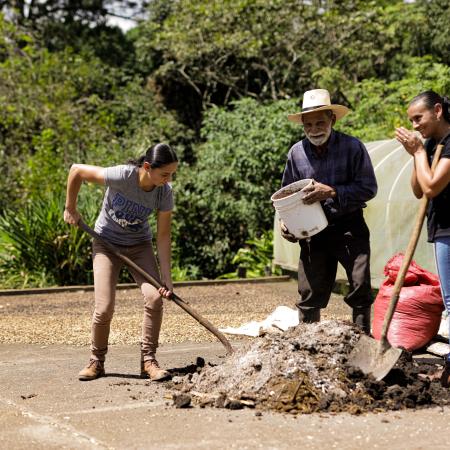
The Alvarados are an example of the family's commitment to join efforts to contribute to the conservation and restoration of biodiversity and ecosystems in the biosphere reserve, but they are also a model of how to share knowledge with other farming families about sustainable production methods that help reduce the impacts of climate change. Don Oscar instilled in his daughters, Karla Patricia and Carmen Elena, his love for the land, a passion that has been passed on to new generations, as his granddaughter Sindy, continues the family legacy by inaugurating the El Nogal Agroecology Field School, where she teaches knowledge for the production of healthy, nutritious, diverse and environmentally friendly food. On the farm, located in the community of El Suptillo, in the biosphere reserve's buffer zone, the Alvarado family grows organic coffee, vegetables through a circular garden, basic grains, sugar cane and its derivatives, as well as honey and beehive by-products, to mention just a few of the livestock activities they practice, in addition to generating employment during the coffee harvest season and stimulating the biosphere reserve's economy. In addition, they have implemented various measures to adapt to climate change, such as the use of organic fertilizers and foliar, produced on the farm, agroforestry systems, living barriers, among others. For Sindy, the cooperation with PROCAMBIO GIZ opened the doors to knowledge for each member of her family, but above all, it cemented changes in attitude and, most importantly, they went from being a model farm to being a model farm.from being a model farm to a knowledge transfer center in agroecology with a simple methodology that provides knowledge about the human farm, resilience to climate change, organic fertilizer production, and the importance of the biosphere reserve and its natural resources in order to contribute to the empowerment of women and men interested in learning about and practicing sustainable and friendly agriculture in the reserve. For the young woman, the objective of the Field School is to "promote the development of sustainable communities within the RBCLSM through agroecological and integrated production, developing experiential practices that strengthen the capacities and ways of working of producers and other interested people.

